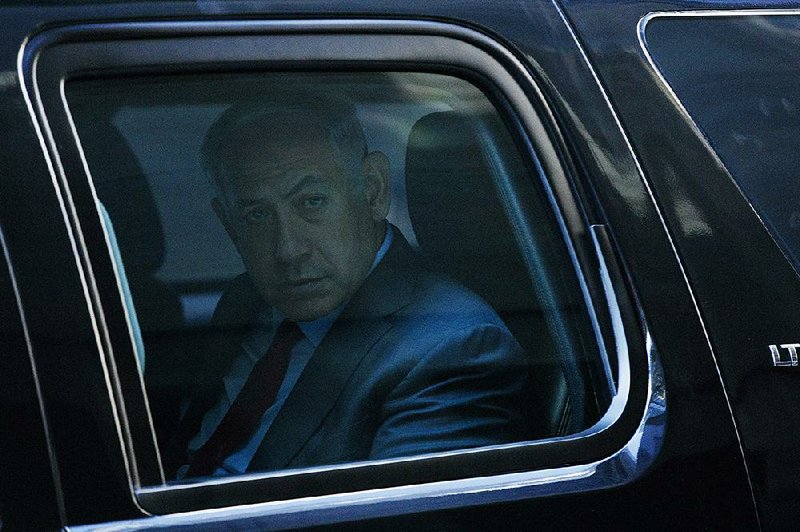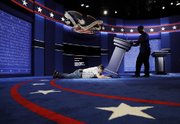NEW YORK -- Hillary Clinton and Donald Trump met separately with Israeli Prime Minister Benjamin Netanyahu on Sunday, giving each candidate the chance to tout their readiness to lead the nation and their knowledge of foreign policy on the eve of their first presidential debate, a little more than six weeks before Election Day.
FULL ELECTION COVERAGE
Meanwhile, the candidates deployed their top supporters to the Sunday news shows to take early jabs at their opponents and to lower expectations for tonight's 90-minute debate at Hofstra University on Long Island, N.Y., which is expected to draw 75 million viewers.
Robby Mook, Clinton's campaign manager, told ABC's This Week of his concerns that the Republican nominee will say things that aren't true and still get a passing grade. He called on moderator Lester Holt to correct any inaccuracies made by the candidates.
Not fact-checking would "extend an unfair bias" to Trump, Brian Fallon, Clinton's spokesman, said on CNN's Reliable Sources.
But Trump's campaign manager, Kellyanne Conway, said it's not the job of debate moderators to check facts.
"I really don't appreciate campaigns thinking it is the job of the media to go and be these virtual fact-checkers and that these debate moderators should somehow do their bidding," Conway said on This Week.
She hailed Holt as a "respected, brilliant newsman."
Trump's vice presidential running mate, Indiana Gov. Mike Pence, said Gennifer Flowers will not attend the debate. In 1992, Bill Clinton denied Flowers' claim of an affair, but in 1998, when asked in a deposition whether he had engaged in sexual encounters with Flowers, he admitted having done so once in 1977.
Trump had tweeted that if frequent critic Mark Cuban attended the debate, "perhaps I will put Gennifer Flowers right alongside of him." Cuban, the billionaire owner of the Dallas Mavericks basketball team, announced on Twitter on Thursday that the Democratic nominee's campaign had given him a front-row seat to watch Clinton "overwhelm" Trump at a debate he said would become known as the "Humbling at Hofstra."
Conway said that in proposing to invite Flowers, Trump had merely been making a point.
"He wants to remind people that he's a great counterpuncher," Conway said on This Week, though she added that Flowers had a right to be at the debate if "somebody else gives her a ticket."
Flowers herself lent credence to the idea: "Yes I will be there," she wrote in a text message to The New York Times on Saturday. She did not respond to follow-up messages on Sunday.
But Pence drew a harder line.
"Gennifer Flowers will not be attending the debate tomorrow night," Pence said on Fox News Sunday. "Donald was using the tweet yesterday really to mock an effort by Hillary Clinton and her campaign to really distract attention from where the people -- the American people -- are going to be focused tomorrow night, which is on the issues. It's on the choice that we face."
Retired Army Lt. Gen. Michael Flynn, a Trump surrogate, added on NBC's Meet the Press that Cuban is "not a legitimate person." He offered no further explanation.
Conway said on CNN that Trump has "no plan to" raise the subject of Bill Clinton's infidelities in the debate, "but the fact is he has every right to defend himself."
Clinton's campaign chairman, John Podesta, said the Flowers issue was part of Trump's "favorite sport, which is to dive in the sewer and go for a swim."
"He's kind of predictable: When you poke him a little bit, and he comes back and attacks whoever is doing it," Podesta said on NBC.
Meeting Netanyahu
Sunday's meetings with Netanyahu were designed to put Israel on good footing with the next U.S. president as well as showcase the candidates' expertise in foreign policy.
Clinton, a former senator and secretary of state, often says that Trump does not know enough about the world and lacks the temperament to be president. Trump has argued that he has extensive experience with foreign policy through his career as a business executive and blames Clinton for many of the nation's troubles in foreign policy.
Clinton met Sunday evening with Netanyahu for about 50 minutes in Manhattan for an "in-depth conversation," according to Clinton campaign officials. Her meeting came after Trump sat down with the prime minister at Trump's residence in Trump Tower for more than an hour in the morning, Israeli and Trump officials said.
Reporters were barred from covering either meeting.
Clinton's campaign said she stressed to Netanyahu that "a strong and secure Israel is vital to the United States."
"She reaffirmed her unwavering commitment to the U.S.-Israel relationship and her plan to take our partnership to the next level," a senior Clinton aide said.
According to her campaign, Clinton pledged her support for the 10-year, $38 billion military aid package signed between the two countries earlier this month and her opposition to efforts to boycott Israel. They also discussed Iran, the conflict in Syria and other regional challenges, including her support for a two-state solution to the Israel-Palestinian conflict, negotiated by the two parties -- not an outside organization such as the U.N. Security Council.
Trump "acknowledged that Jerusalem has been the eternal capital of the Jewish People for over 3,000 years, and that the United States, under a Trump administration, will finally accept the long-standing Congressional mandate to recognize Jerusalem as the undivided capital of the State of Israel," his campaign said after Sunday's meeting.
Trump and Netanyahu "discussed at length Israel's successful experience with a security fence that helped secure its borders," according to a statement from the Republican presidential nominee's campaign.
Trump's campaign said the Republican presidential nominee also promised "extraordinary strategic, technological, military and intelligence cooperation between the two countries" if he's elected.
Trump said "peace will only come when the Palestinians renounce hatred and violence and accept Israel as a Jewish State," the campaign said in the statement. He and Netanyahu also discussed U.S. military assistance to Israel, regional stability, and the country's technology sector, as well as the Iran nuclear deal, which both oppose.
A brief statement from Netanyahu's office said the pair discussed "issues relating to Israel's security and its efforts to achieve stability and peace in the Middle East."
"Prime Minister Netanyahu thanked Mr. Trump for his friendship and support for Israel," according to the statement.
Kaine and Pence
Both the candidates' running mates on Sunday responded to questions about each presidential nominee's relationship with the truth.
When Clinton's vice presidential nominee, Sen. Tim Kaine, D-Va., was asked about voters' perception of Clinton as untrustworthy, Kaine cited "her long track record of service."
"I tell the story about her being first lady of the United States, when the effort to get [universal health care] done failed, and that was a tough, tough, bitter loss, but then it tested her as a leader," Kaine said on CBS' Face the Nation. "And she worked together with Democrats and Republicans to get health insurance for 8 million low-income American children in the [Children's Health Insurance Program].
"The measure of character in somebody in public life, I think, is whether they have a passion for somebody other than themselves and whether they keep after that passion whether they are winning or losing," he said. "Hillary has demonstrated that again and again. And I think that's a sharp contrast to a Donald Trump, whose only recognized passion in his life has been for himself."
Kaine said he expects the debate format to explore the truthfulness of both candidates' claims.
"There's a real opportunity to hear somebody say something and then get into whether that is actually true or not," he said.
When Face the Nation host John Dickerson asked Pence whether Trump will limit himself to the truth during tonight's debate, Pence replied, "I think Donald Trump always speaks straight from his mind and straight from his heart. I think he's the most bold truth-teller to run for president of the United States."
"He's going to speak the truth to the American people," Pence added. "That's why you see the tremendous momentum in this campaign. You see it in the polls. There's polls out today that show this is virtually a dead heat. There's tremendous momentum, because the American people want change, and they see in Donald Trump a leader who embodies the American spirit."
The presidential campaign has frequently focused on the American spirit, according to Randall Kennedy, a professor of law at Harvard whose books include The Persistence of the Color Line: Racial Politics and the Obama Presidency. He said Clinton and Trump have split over racial and gender issues more than any two presidential opponents in decades.
"The extremity of the divergence is unlike anything I have confronted in my adult life," Kennedy said. "The analogies that come to mind are Goldwater versus Johnson in 1964, and Lincoln versus Douglas in 1860."
Many Democrats believe Clinton has the edge.
"Race and gender are often ignored, often belittled with ridiculous sound bites," said Donna Brazile, chairman of the Democratic National Committee. "Having the two of them debate race and gender issues would show more clearly than anything else that one candidate has a record and vision to bring people together, and one has offered the most divisive, bigoted and sexist comments and policies we've seen from a major party nominee."
But Republicans see electoral advantages for Trump, who is emphasizing security at a time of unpredictable violence in American cities.
Newt Gingrich, the former House speaker and a Trump adviser, said Trump has an opening to present himself as a stern leader and an agent of change for minority groups, though he also encouraged Trump to acknowledge directly that blacks faced "a steeper hill to climb."
"I'm hoping he'll do more of it," Gingrich said, "and communicate that being black in America is different and is harder, that the legacy of slavery and discrimination is real."
Information for this article was contributed by Laurie Kellman, Jill Colvin and Ken Thomas of The Associated Press; by Ben Brody, Kevin Cirilli, David Wainer, Jennifer Jacobs and Jennifer Epstein of Bloomberg News; by Ashley Parker, Maggie Haberman, Patrick Healy and Alexander Burns of The New York Times; and by Janell Ross, John Wagner, Jose A. DelReal and Abby Phillip of The Washington Post.
A Section on 09/26/2016

